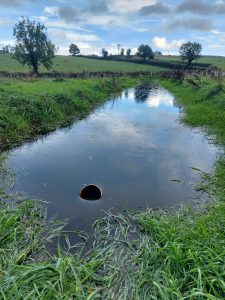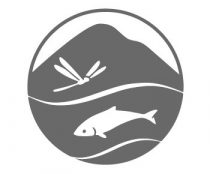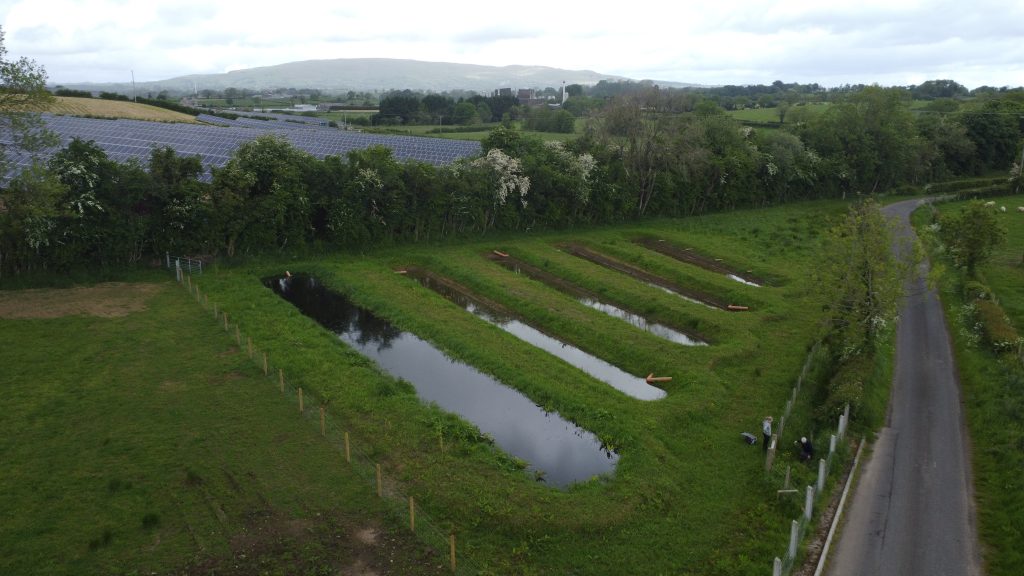WIN/WIN AS BALLINDERRY RIVERS TRUST PROJECT PROVES FARM WATER FILTRATION INNOVATION DELIVERS PROFITS WHILE ALSO PROTECTING THE ENVIRONMENT
The Water Innovation Network (WIN) is in the concluding stage of an ambitious project aimed at revolutionising farming practices and improving farm productivity while safeguarding water quality in the Ballinderry catchment area of Northern Ireland.
Keen to share the very positive findings of the project, there is an open invitation to all farmers, landowners, and agribusiness to attend three upcoming on-farm demonstrations in the Cookstown area on Thursday, June 29th.
In a two-and-a-half-year project led by Ballinderry Rivers Trust (and comprising a coalition of dedicated local farmers, The Ulster Farmers Union and, agri-scientists and experts in business innovation), affordable and effective nature-based solutions have been trialled to find ways of cleaning dirty water on farms while also providing opportunities for agri-businesses to open new revenue streams.
Chief Executive of Ballinderry Rivers Trust and All-Ireland Director at The Rivers Trust, Mark Horton, said: “As this project concludes this month, we are delighted with the results we are seeing. Our primary objective was to identify and trial solutions that address water management challenges on farms by developing integrated, nature-based solutions that both protect the water environment and enhance the productivity and profitability of farm businesses. Our innovations had to deliver a win/win for farmers and the environment. We now want to share our learnings with the farming community and help them take the necessary steps to bring these well-tested innovations to their businesses.”
With water management being an ongoing challenge for farmers in Northern Ireland, where on average 1230mm of rain falls per square meter each year, effective diversion, separation, and collection of dirty water is crucial. Failure to do so allows the water to carry contaminants such as nutrients, chemicals, and soil across farms into nearby watercourses, leading to loss of valuable soil and nutrients from the farm and potential legal repercussions, including fines, loss of subsidies, and even custodial sentences. In addition to the negative impact on water quality and local wildlife, mismanagement of water also imposes significant costs on farm businesses, causing financial strain and time constraints, particularly for part-time farmers who face limited resources.
“Integrated constructed wetlands are an excellent and well-proven nature-based solution for filtering and cleaning dirty water. However, the cost and scale to construct them mean installation on smaller farms is often impossible. Through the support of the European Agricultural Fund for Rural Development and Department of Agriculture, Environment & Rural Affairs (DAERA), this European Innovation Partnership (EIP) project draws on 25 years of experience of Ballinderry Rivers Trust, allowing us to develop several unique solutions based on the same principles of a constructed wetland but on a more manageable and cost-efficient scale,” Mark said.
After research and exploration of what was manageable, practical, and deliverable, the Water Innovation Network team opted to install swales on four test farms, including beef, pig, and dairy businesses, in the Ballinderry River catchment area near Cookstown.
A swale is a shallow, vegetated channel or depression that follows the land’s natural topography. The primary purpose of a swale is to collect and slow down stormwater runoff, in this case from farmyards, roofs and laneways. Vegetation both in and along the swales take up nutrient and help to absorb water, further aiding in water infiltration and purification. By slowing down the water from the farmyard and hard surfaces, the swales help prevent erosion, reduce flooding, and improve water quality by filtering out pollutants and sediments.
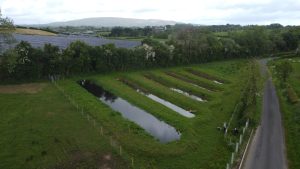
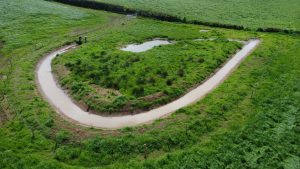
Mark said: “We get a lot of rain in Northern Ireland. For hard surfaces on farms, such as a shed roof or concrete yard, you need a lot of storage to collect and hold all the dirty water produced. Swales offer a manageable mini wetland to filter dirty water runoff, allowing the water to leave the farm clean.”
The innovative approach trialled in this project saw both open and underground swales planted with deep-rooted, water-hungry comfrey, which, once harvested, can be turned into nutrient-rich fodder or fertiliser for use on the farm or sold to secondary producers making a financial return to the farm business. On one farm in the trial, water from the swales also trickled to a willow plantation, the crop of which can again be used or sold for basket making or biofuel.
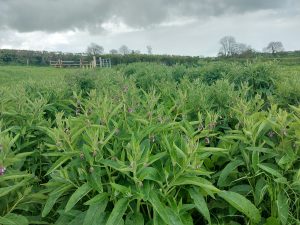
“While we started with a mission to improve water quality, this project has shown that with innovative thinking, new ways of doing business emerge that benefit farm business, the water environment, biodiversity, and the wider economy. Using well-designed swales to filter water and grow a cash crop, local farms can open new revenue streams and support the development of satellite businesses they will supply. Thanks to our innovative methods, we have proved that farmers don’t have to give up huge swathes of land or invest hundreds of thousands of pounds to get peace of mind about how they manage water on their farms,” Mark said.
Ballinderry Rivers Trust Farmer Advisor Eoin Devlin was instrumental in delivering these farm trails and hopes the evidence gained through the project will inspire farmers within and beyond the catchment to explore nature-based solutions in their businesses.
“Every farm is unique, so while we have great insight into the principles of scalable water filtration through wetland and swale construction, every solution needs to be bespoke to meet the needs of the farmer, the conditions on the land and farm business productivity and sustainability. The one thing that unites all farmers is a desire to improve their business. Our work will empower farmers with the tools and understanding necessary to adopt these innovative practices, leading to a more resilient and prosperous agricultural sector while protecting and enhancing water quality in Northern Ireland,” he said.
As the WIN trail project, funded by the European Agricultural Fund for Rural Development and DAERA, concludes this month, the delivery team will be producing reports, guides and videos to show what is possible with the innovative installation of swales in the hope their work will encourage other farmers to invest in this affordable and effective nature-based solution to cleaning dirty water runoff and converting it into profits.
Mark concluded: “The best way to understand how effective these underground and overground swales are, is to see them in action. Therefore, we invite farmers, landowners, industry stakeholders and other interested parties to visit our three test farms and learn more from the Ballinderry Rivers Trust team that has innovated and delivered these inspiring pilot projects. While this project has ended, there may be opportunities through other farm payment schemes to explore these solutions on other farms, and we are happy to explore these options with anyone who is interested.”
For more details on the project, please visit www.waterfriendlyfarming.com
If you would like to see how the WIN solutions are working on farms, you are invited to attend the following events, which all take place on Thursday, June 29th. You can email in advance (eoin@ballinderryriver.org) to have your details added to the future information network, or you can simply turn up and enjoy one or all the farm tours.
Farm tours Thursday 29th June
- 3pm to 3.45pm: Millar’s Pig Farm, 26 Lismoney Road, Cookstown, County Tyrone, BT80 8RH.
- 4pm to 4.45pm: Brown’s Beef Farm, 12 Ballydawley Road, Magherafelt, BT45 7NL.
- 30pm to 7.15pm: Cloughbane Farm, 160 Tanderagee Road, Pomeroy, Dungannon, BT70 3EB.
Editors Notes
- Ballinderry Rivers Trust is an environmental charity dedicated to the conservation, protection, and improvement of the Ballinderry River (Counties Derry-Londonderry and Tyrone), the western shore rivers and streams of Lough Neagh and the Lough itself.
- For more information about The Rivers Trust movement, visit theriverstrust.org
- For further information contact Mark Horton mark@ballinderryriver.org or Eoin Devlin eoin@ballinderryriver.org
BALLINDERRY RIVERS TRUST
231a Orritor Road,
Cookstown,
County Tyrone,
BT80 9NB,
Northern Ireland
+44 (0) 28 867 61515
+44 (0) 7572 287509
